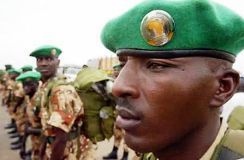Western leaders waiting for African solutions to African wars
By TERRY LEONARD, Associated Press Writer
JOHANNESBURG, South Africa, Aug 19, 2004 (AP) — As the month-end deadline nears for Sudan to disarm the Janjaweed militias in Darfur, the United Nations and Western powers debate how far to go to stop the killing in an African country.
 Still leery because of the fiasco in Somalia a decade ago, the West is reluctant to intervene militarily in Africa _ afraid of entanglement in a deadly quagmire far from home on top of continuing troop engagements in Iraq and Afghanistan.
Still leery because of the fiasco in Somalia a decade ago, the West is reluctant to intervene militarily in Africa _ afraid of entanglement in a deadly quagmire far from home on top of continuing troop engagements in Iraq and Afghanistan.
Western nations want Africa to lead _ to find African solutions for African problems. But analysts say the governments of the continent lack the cohesion, resources and political will.
So while diplomats bicker and governments dither, Africans die from bullets and hunger in backwater wars.
In Sudan’s Darfur region, for example, at least 1.2 million black Africans have fled the mostly Arab militias that have killed tens of thousands of civilians in response to a rebellion.
“What is needed now is for someone to go in _ not with a peacekeeping force but with an enforcement force,” said Chris Landsberg, co-director of the South African Center for International Relations. “The African Union is not ready for that. They are already overstretched in Burundi and Congo.”
While Africans die, the West debates whether the deaths should be classified as genocide, as the U.S. Congress has declared it, or ethnic cleansing.
Landsberg accused the West of seeking ways to avoid calling it a genocide _ a definition that would require action under the 1948 Geneva Convention.
In the case of Darfur, he said, “I think we are heading for genocide unless decisive action is taken.”
A decade ago, Hutu extremists in Rwanda slaughtered more than 500,000 people, mostly Tutsis, while the U.N. Security Council, paralyzed by events in Somalia to the north, watched from afar. Instead of beefing up a U.N. force in the country to stop the killing, it ordered the withdrawal of the peacekeepers.
In the years that followed, all agreed they should have done more.
Now, faced with another killing field in Africa, there is still no clear idea how to proceed.
Both the United States and the United Nations bluntly told Sudan to end the violence and disarm the militias known as the Janjaweed by the end of August. They threatened punitive sanctions and hinted at military intervention but have not yet announced what actions they will take.
A U.S. State Department official said earlier this week that the Security Council will consider what action to take at the end of the month.
The Sudanese government says it has made a start but needs more time, and has angrily rejected the idea of foreign intervention.
Mills and other analysts believe Africa is not ready to act and that the United Nations won’t. He expects the United Nations will buy time on Darfur by extending the deadline and requiring more monitoring.
“The U.N. doesn’t have the stomach or political will to act in this region,” Mills said.
Somalia is the oft-cited reason for Western reluctance, even though that effort to save people from a civil war-induced famine that already had killed 370,000 was a success.
U.S.-led troops landed in December 1992, made sure food relief got to the people and defeated the famine. The United Nations credited the troops with saving at least 100,000 lives.
But mission creep gradually changed the role from feeding the people to fighting the warlords who caused the famine. After 29 U.S. soldiers died in action, 18 in a single battle, the Americans and ultimately all other Western forces withdrew.
Somalia was deemed a failure and Africa too remote, too risky. It was cited at the time as a key reason why the U.N. backed down in Rwanda.
“The West has allowed the quagmire argument to become a cheap alibi just like finding African solutions for African problems has become an alibi for inaction,” said Landsberg.
Analysts note that in the few cases when the West has intervened, the record has been good.
When British troops landed in Sierra Leone in 2000, major fighting stopped almost immediately. French forces blocked a rebel advance on the Ivory Coast capital in 2002. And the Americans, with only a tiny show of force, helped quell the violence in the Liberian capital last year.
Darfur may be a test case for the West’s genuine engagement.
Critics say the West went to war with Serbia to end ethnic cleansing in Kosovo on a scale smaller than that in Darfur.
Kosovo was within the West’s area of strategic interest; wars and refugees in Africa are not seen as a direct threat to the West.
“It is difficult to envisage a situation in Africa where the U.S. is going to take the lead and expect the African Union to follow,” said Tom Lodge, head of the political science department at the University of the Witwatersrand in Johannesburg.
Landsberg bemoaned an emerging “apartheid of peacekeeping” situations where African troops do the fighting and the dying, and the West simply writes a check.
